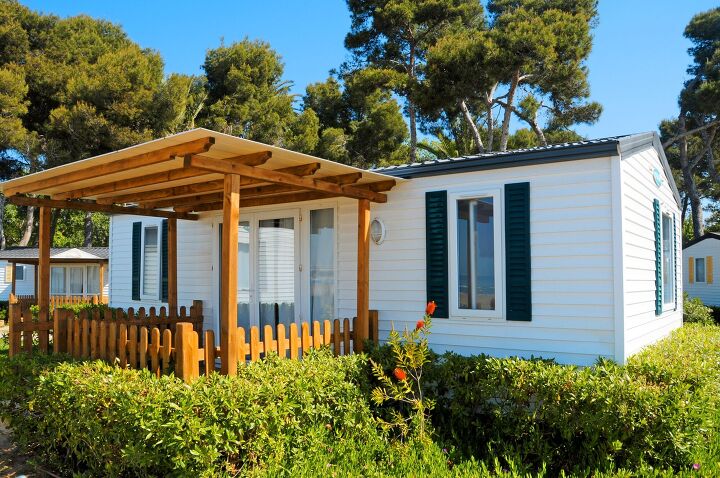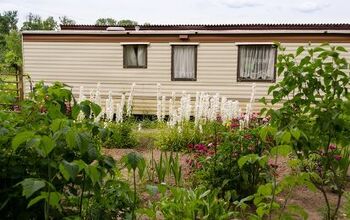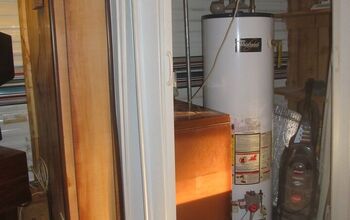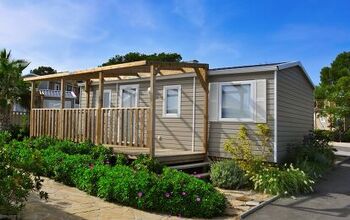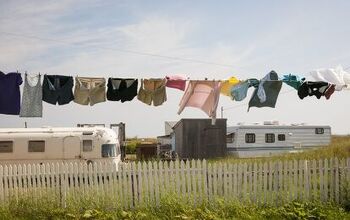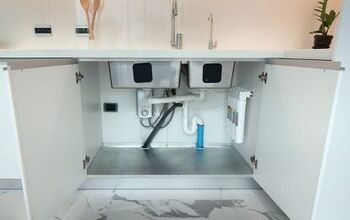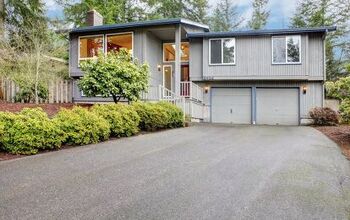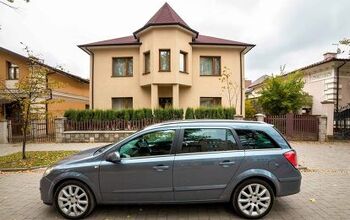Where Can I Put A Mobile Home?

With housing prices at all-time highs and mortgage rates climbing, buying a home often feels less achievable than ever before. Many people simply can’t afford the combination of a down payment and the high monthly mortgage costs required for a single-family home. Mobile homes offer a more affordable solution to those looking for a stand-alone home with a bit of land around it. If you are thinking about going in this direction, you might be asking yourself, “Where can I put a mobile home?”
You can put mobile homes in several locations, but the best and most popular place is on land you own. This allows the owner more freedom when it comes to the permanent placement of the home. Other common locations for mobile homes include leased land, free land, and mobile home parks. Make sure to consult local laws, zoning, and building codes, as they vary significantly from place to place.
If you are one of the many people considering purchasing a mobile home in the near future, make sure you have a place to put it. The term “mobile” might make you think you can move it around at will. In reality, you might be able to move a mobile home when necessary, but it is best to find a permanent or at least semi-permanent place to put your mobile home. Read on to find out the best places to put a mobile home, and where you should never put one.
Where Can I Put A Mobile Home?
Asking where you can put a mobile home might sound like a simple question, but the answer is a bit complex. In general, placing a mobile home on land you own is the best idea, but this is easier said than done. Homes aren’t the only real estate that have skyrocketed recently. Land in many places is just as expensive.
Furthermore, even when you own land, you might not be able to put your mobile home on it. This is because mobile homes are sometimes considered undesirable to look at, so some neighborhoods, HOAs, and communities do their best to find ways to outlaw them. Before purchasing a mobile home, and certainly before installing one on your property, do a deeper dive into what the rules are when it comes to placing a mobile home.
Rules That Restrict Where I Can Put My Mobile Home
Before buying a mobile home it’s important to know that you can’t put it wherever you want. In fact, just like with any property, there is plenty of red tape, paperwork, and fees involved in locating (or relocating) a mobile home. Below are some of the common rules and laws associated with finding a home for a mobile home.
Moving Permits
You can’t simply place a mobile home wherever you want. Nor can you move it any time you feel like it without approval. Before moving a mobile home to your desired location, you need to obtain moving permits.
This process is different depending on where you live but usually involves proving ownership by showing the title, and also ensuring that you don’t owe any fees or taxes on the home before relocating it. Be sure to find out what you need for a moving permit where you live and where you plan to locate the mobile home.
Building Codes
A mobile home also needs to be up to code. The good news is that if you are purchasing a newer mobile home, it should be up to most areas’ building codes. This is because there are stricter and more specific rules that dictate how a mobile home must be manufactured.
Still, it will need to pass an inspection. If you have a much older mobile home (before 1976), you might find it difficult to pass these inspections, so make sure your home will pass the building codes for the area where you want to relocate it.
Local Laws
Every town has its own laws about homes. These laws vary significantly. Some areas are very lax while other jurisdictions are incredibly specific and strict when it comes to the type of homes allowed within certain zones. Make sure your mobile home is even allowed in the area you want to place it before continuing on to the next steps.
Home Mover Requirements
Keep in mind mobile homes also require special movers. You can’t just place it yourself and do all the hookups on your own. The exact requirements can vary, however, depending on where you live.
Five Locations Where You Can Put A Mobile Home
1. Land You Own
By far the best and most desirable place to put a mobile home is on land that you own. Placing a mobile home on land you own means you are your own landlord, which means you have much more freedom.
You have much more autonomy when it comes to the size and type of mobile home you place, as well as how you design the exterior, including a driveway, yard, porch, and other popular add-ons.
Keep in mind just because you own the land does not give you free rein. You still need to follow all zoning and building codes mentioned above, but you at least won’t have to deal with the additional burden of a landowner dictating what you can do.
2. Privately Owned Land (With Approval And Agreement)
If you don’t own land and can’t currently afford to purchase land, don’t worry, there are other options. In fact, you can put a mobile home on privately owned land. You just need to make sure you are following all the rules and will have to sign more paperwork.
Whether you put your mobile home on a friend’s land or reach an agreement with a family member or someone else, if you have approval, you can put your mobile home on someone else’s privately owned land. Keep in mind that you still must follow all zoning and building codes in this area.
Also, make sure you are comfortable with this agreement, and that it is not one that will quickly fizzle. After all, it might seem like a great deal to put a mobile home on someone else’s land, but if you need to relocate the mobile home quickly for some reason due to the landowner reneging on the deal, it can be a huge and costly headache.
3. Leased Land
Believe it or not, it is possible to own a mobile home on land that is leased. This might sound a bit complicated, but it isn’t all that complex. You can lease land from a private owner, which gives you more rights than simply having permission to use a private owner’s land.
When you lease land, you sign an agreement, just as if you were signing a lease for a home rental. This means you have certain rights, and cannot be evicted from the land without just cause, which gives you some stability.
Keep in mind, however, that in addition to not owning the land, you will also need to get approval from the landowner to make any changes or improvements on the land. This includes any landscaping, and might even include changes to your home’s exterior or energy usage.
4. Free Land
Homesteading is no longer practiced in the United States. There are, however, still places that are trying to encourage people to move to their towns. When a city has a dwindling population, they need more citizens to survive. One way they might try to entice people to move there is by offering land to place mobile homes, RV’s, and other living dwellings for free to encourage growth in the economy.
These types of incentives often come with lots of rules, like building on a particular lot, or improving upon the property that already exists. But this is an option worth considering for those without the financial means of buying a home who are open to living anywhere.
5. Mobile Home Parks
Mobile home parks are a convenient and easy place to put a mobile home. There are mobile home parks located all over the United States. They come in all sorts of varieties. They range from bare-bones locations to high-end mobile home parks with luxury amenities. Some mobile home parks even have pools, gyms, common areas, and barbecue zones.
Mobile home parks are a popular place to put a mobile home because everything is already set up. The zoning in these parks is approved for mobile homes (as long as it passes a building inspection), and most of the legwork is done for you.
Also, mobile home parks already have most utilities like electricity, sewer, and water all hooked up and ready to go. This makes putting a mobile home in a mobile home park an easy and attractive option. This is especially true for those who don’t mind having lots of neighbors.
Keep in mind mobile home parks can be noisy. They also might have extra fees, and could have lots of rules as well, similar to an HOA.
Factors To Consider When Looking For A Mobile Home Location
- Consider The Taxes: Make sure you take the property tax costs into consideration. Based on the state, city, and area you choose to place your mobile home, the taxes can vary by thousands of dollars per year. One of the benefits of a mobile home is you can move it somewhere where taxes are lower.
- Determine Exactly What Permits And Approvals Are Required: Before you fall in love with a piece of land, make sure it is not going to involve lots of headaches. Make sure you are comfortable with the approvals required to place your mobile home in the location you desire.
- Access To Utilities: Does the land have utilities hooked up? If not, make sure you budget for the costs involved in running utilities. This includes things like water, sewage, and electricity onto the land. Make sure it is even possible before locking yourself in.
- The Property Size: Ensure the lot of land is big enough not only for the home but for any yard, landscaping, parking area, and other outdoor needs you require.
- Flooding And Other Extreme Weather Risks: Mobile homes might be built better today than ever before, but they are not nearly as stable as homes with foundations. Mobile homes are at much higher risk of damage during extreme weather like flooding or hurricanes. Be sure to do your research on the weather, elevation, and risk level.
- How Sturdy And Secure Is The Ground: The ground itself is also important to consider. Make sure the ground is solid and sturdy. Some areas have land that can sink significantly under pressure, or worse. Make sure the ground is solid and sturdy enough to hold your home.
Wrapping Up Where You Can Put A Mobile Home
The term mobile home might make you think that you can pick up this type of dwelling and place it anywhere. In reality, there are zoning and building codes that dictate where you can and can’t place a mobile home. These laws and rules vary from location to location. You must follow all of them. This is true even if you own the land where the mobile home sits. You can also lease land or try to find free land. Also consider putting your mobile home in a mobile home park.
Related Guides:

Tom Gaffey is an expert writer who currently resides in Washington D.C. Tom has a passion for real estate and home improvement writing, as well as travel and lifestyle writing. He lived the last twelve years in Hawaii where he worked closely with luxury resorts and event planners, mastering his knowledge of aesthetics and luxury products. This is where he found his passion for home improvement and a keen interest in DIY projects. Currently, Tom resides in Washington D.C, and also working on his debut fiction novel.
More by Tom Gaffey



